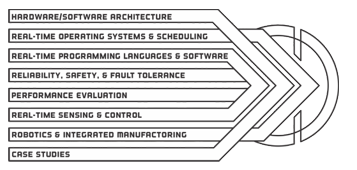Submissions of extended abstracts describing exciting new, in-progress, and/or experimental research are invited for the Work-in-Progress (WIP) session of the IEEE Real-Time Systems Symposium (RTSS). The WiP session is devoted to the presentation of new and on-going research in real-time systems, theory, and applications. The primary purpose of the WiP session is to provide researchers with an opportunity to discuss their evolving ideas and gather feedback from the real-time community at large. Of particular interest are ideas and contributions that present significant paradigm shifts, explore unique and unconventional approaches to important problems, or investigate fundamental departures from conventional wisdom in adopted solutions. WiP topics include, but are not limited to:
- Adaptive systems theory and practice
- Architectural support
- Case studies
- Compiler support
- Cyber-physical systems
- Design and Verification
- Embedded systems
- Energy management
- Formal methods
- Model-based development
- Multicore real-time support
- Multi-criticality analysis and support
- Multimedia computing
- Performance modeling
- QoS support
- Real-time and dependability
- Real-time databases
- Real-time programming languages
- Real-time sensor/actuator networks
- Real-time systems middleware
- Scheduling algorithms
- Security and survivability
- Software engineering
- System development tools
- Systems integration
- Wireless Sensor Networks
- Worst-case execution time estimation
The WiP session will be held during the symposium. Accepted submissions will be included in a separate RTSS WiP Proceedings, which will be distributed to all RTSS symposium participants and will be available electronically from the RTSS home page. In addition, as of this year, for each accepted submission a 1-page poster abstract will be included in the main RTSS proceedings. One author of every accepted paper should be registered to the conference and present the paper during the conference. All WiP projects will be presented orally and in a poster session.
Submission Instructions
Each submission should consist of two parts:
- a 1-page Poster Abstract with a title starting with “Poster Abstract” followed by a colon before the title of the work (e.g., “Poster Abstract: Name of RTSS WiP Abstract”),
- a maximum 4-page Extended Abstract submission describing original on-going work.
These two abstracts should be combined into a single pdf document, and thus the length of submitted documents should NOT exceed 5 (five) pages including references and figures – submissions exceeding 5 pages will not be reviewed.
The 1-page Poster Abstracts will be published in the main RTSS proceedings and the 4-page Extended Abstracts will be published in the RTSS WiP proceedings.
Papers should be formatted as single-space, double-column (normal IEEE format), in a 10 point font. Templates are available at:
http://www.ieee.org/conferences_events/conferences/publishing/templates.html
The paper submission page can be found at:
https://easychair.org/conferences/?conf=wipforrtss2016
Important Dates
Deadline: September 7, 2016 – Submission of Abstracts
September 19, 2016 – Notification of Acceptance
September 26, 2016 – Camera-ready Submission
Program Committee
Iain Bate, University of York, UK (Chair)
Miroslav Pajic, Duke University, USA
Björn Brandenburg, MPI-SWS, Germany
Arvind Easwaran, NTU, Singapore
Vincent Nelis, CISTER/ISEP, Portugal
Jan Reineke, Saarland University, Germany
Dorin Maxim, INRIA, France
Florian Pölzlbauer, Virtual Vehicle, Austria
Benjamin Lesage, University of York, UK
